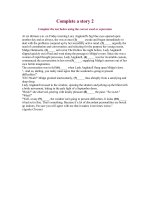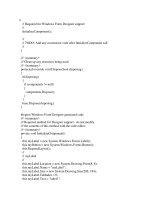A simple story
Bạn đang xem bản rút gọn của tài liệu. Xem và tải ngay bản đầy đủ của tài liệu tại đây (1.26 MB, 333 trang )
TheProjectGutenbergEBookofASimpleStory,byMrs.Inchbald
ThiseBookisfortheuseofanyoneanywhereatnocostandwith
almostnorestrictionswhatsoever.Youmaycopyit,giveitawayor
re-useitunderthetermsoftheProjectGutenbergLicenseincluded
withthiseBookoronlineatwww.gutenberg.org
Title:ASimpleStory
Author:Mrs.Inchbald
Editor:G.L.Strachey
ReleaseDate:July5,2007[EBook#22002]
Language:English
***STARTOFTHISPROJECTGUTENBERGEBOOKASIMPLESTORY***
ProducedbyDavidEdwards,MarciaBrooks,andtheOnlineDistributed
ProofreadingTeamat(Thisfilewasproduced
fromimagesgenerouslymadeavailablebyTheInternetArchive/American
Libraries.)
ASIMPLESTORY
BY
MRS.INCHBALD
WITHANINTRODUCTIONBY
G.L.STRACHEY
LONDON
HENRYFROWDE
1908
OXFORD:HORACEHART
PRINTERTOTHEUNIVERSITY
Transcriber'sNote:TableofContentsAdded.
LeftArchaicspellings,butmademinorchangestopunctuation.
CONTENTS
INTRODUCTION
PREFACE.
VOLUMEI
CHAPTERI.
CHAPTERII.
CHAPTERIII.
CHAPTERIV.
CHAPTERV.
CHAPTERVI.
CHAPTERVII.
CHAPTERVIII.
CHAPTERIX.
CHAPTERX.
CHAPTERXI.
CHAPTERXII.
CHAPTERXIII.
CHAPTERXIV.
CHAPTERXV.
CHAPTERXVI.
CHAPTERXVII
VOLUMEII
CHAPTERI.
CHAPTERII.
CHAPTERIII.
CHAPTERIV.
CHAPTERV.
CHAPTERVI.
CHAPTERVII.
CHAPTERVIII.
CHAPTERIX.
CHAPTERX.
CHAPTERXI.
CHAPTERXII.
VOLUMEIII
CHAPTERI.
CHAPTERII.
CHAPTERIII.
CHAPTERIV.
CHAPTERV.
CHAPTERVI.
CHAPTERVII.
CHAPTERVIII.
CHAPTERIX.
CHAPTERX.
CHAPTERXI.
CHAPTERXII.
CHAPTERXIII.
CHAPTERXIV.
VOLUMEIV
CHAPTERI.
CHAPTERII.
CHAPTERIII.
CHAPTERIV.
CHAPTERV.
CHAPTERVI.
CHAPTERVII.
CHAPTERVIII.
CHAPTERIX.
CHAPTERX.
CHAPTERXI.
CHAPTERXII.
PlayswrittenbyMrs.Inchbald
INTRODUCTION
ASimpleStoryisoneofthosebookswhich,forsomereasonorother,have
failedtocomedowntous,astheydeserved,alongthecurrentoftime,buthave
driftedintoaliterarybackwaterwhereonlytheprofessionalcriticorthecurious
discoverer can find them out. "The iniquity of oblivion blindly scattereth her
poppy;"andnowheremoreblindlythanintherepublicofletters.Ifwewereto
inquirehowithashappenedthatthetruevalueofMrs.Inchbald'sachievement
haspassedoutofgeneralrecognition,perhapstheanswertoourquestionwould
be found to lie in the extreme difficulty with which the mass of readers detect
andappreciatemerequalityinliterature.Theirjudgmentisswayedbyahundred
side-considerations which have nothing to do with art, but happen easily to
impresstheimagination,ortofitinwiththefashionofthehour.Thereputation
ofMrs.Inchbald'scontemporary,FannyBurney,isacaseinpoint.Everyonehas
heard of Fanny Burney's novels, and Evelina is still widely read. Yet it is
impossibletodoubtthat,sofarasqualityaloneisconcerned,Evelinadeservesto
be ranked considerably below A Simple Story. But its writer was the familiar
friendofthegreatestspiritsofherage;shewastheauthorofoneofthebestof
diaries; and her work was immediately and immensely popular. Thus it has
happenedthatthenameofFannyBurneyhasmaintaineditsplaceupontheroll
ofEnglishnovelists,whilethatofMrs.Inchbaldisforgotten.
ButtheobscurityofMrs.Inchbald'scareerhasnot,ofcourse,beentheonly
reasonforthe neglect ofherwork.Themeritsof ASimpleStoryareofakind
peculiarlycalculatedtoescapethenoticeofagenerationofreadersbroughtup
on the fiction of the nineteenth century. That fiction, infinitely various as it is,
possesses at least one characteristic common to the whole of it—a breadth of
outlookuponlife,whichcanbeparalleledbynootherbodyofliteratureinthe
worldsavethatoftheElizabethans.Butthecomprehensivenessofviewshared
by Dickens and Tolstoy, by Balzac and George Eliot, finds no place in Mrs.
Inchbald's work. Compared with A Simple Story even the narrow canvases of
JaneAustenseemspaciouspicturesofdiversifiedlife.Mrs.Inchbald'snovelis
notconcernedwiththeworldatlarge,orwithanysectionofsociety,hardlyeven
with the family; its subject is a group of two or three individuals whose
interactionformsthewholebusinessofthebook.Thereisnolocalcolourinit,
no complexity of detail nor violence of contrast; the atmosphere is vague and
neutral,theactionpassesamongill-definedsitting-rooms,andthemostpoignant
sceneinthestorytakesplaceuponastaircasewhichhasneverbeendescribed.
Thus the reader of modern novels is inevitably struck, in ASimple Story, by a
sense of emptiness and thinness, which may well blind him to high intrinsic
merits.Thespiritoftheeighteenthcenturyiscertainlypresentinthebook,butit
is the eighteenth century of France rather than of England. Mrs. Inchbald no
doubtowedmuchtoRichardson;herviewoflifeistheindoorsentimentalview
ofthegreatauthorofClarissa;buthertreatmentofithasverylittleincommon
withhismethodofmicroscopicanalysisandvastaccumulation.Ifshebelongsto
any school, it is among the followers of the French classical tradition that she
mustbeplaced.ASimpleStoryis,initssmallway,adescendantoftheTragedies
ofRacine;andMissMilnermayclaimrelationshipwithMadamedeClèves.
Besideshernarrownessofvision,Mrs.Inchbaldpossessesanotherquality,no
less characteristic of her French predecessors, and no less rare among the
novelists of England. She is essentially a stylist—a writer whose whole
conceptionofherartisdominatedbystylisticintention.Herstyle,itistrue,ison
thewholepoor;itisoftenheavyandpompous,sometimesclumsyandindistinct;
compared with the style of such a master as Thackeray it sinks at once into
insignificance. Butthe interest ofherstyledoes not liein its intrinsicmeritso
much as in the use to which she puts it. Thackeray's style is mere ornament,
existingindependentlyofwhathehastosay;Mrs.Inchbald'sispartandparcel
ofhermatter.Theresultisthatwhen,inmomentsofinspiration,sherisestothe
height of her opportunity, when, mastering her material, she invests her
expression with the whole intensity of her feeling and her thought, then she
achieveseffectsoftherarestbeauty—effectsofakindforwhichonemaysearch
throughThackerayinvain.Themosttriumphantofthesepassagesisthescene
on the staircase of Elmwood House—a passage which would be spoilt by
quotation and which no one who has ever read it could forget. But the same
qualityistobefoundthroughoutherwork."Oh,MissWoodley!"exclaimsMiss
Milner,forcedatlasttoconfesstoherfriendwhatshefeelstowardsDorriforth,
"I love him with all the passion of a mistress, and with all the tenderness of a
wife."Noyounglady,evenintheeighteenthcentury,evergaveutterancetosuch
asentenceasthat.Itisthesentence,notofaspeaker,butofawriter;andyet,for
thatveryreason,itisdelightful,andcomestouschargedwithacurioussenseof
emotion,whichisnonethelessrealforitselaboration.InNatureandArt,Mrs.
Inchbald's second novel, the climax of the story is told in a series of short
paragraphs, which, for bitterness and concentration of style, are almost
reminiscentofStendhal:
Thejuryconsultedforafewminutes.Theverdictwas"Guilty".
Shehearditwithcomposure.
ButwhenWilliamplacedthefatalvelvetonhisheadandrosetopronounce
sentence, she started with a kind of convulsive motion, retreated a step or two
back,and,liftingupherhandswithascream,exclaimed—
"Oh,notfromyou!"
The piercing shriek which accompanied these words prevented their being
heardbypartoftheaudience;andthosewhoheardthemthoughtlittleoftheir
meaning,morethanthattheyexpressedherfearofdying.
Serene and dignified, as if no such exclamation had been uttered, William
deliveredthefatalspeech,endingwith"Dead,dead,dead".
She fainted as he closed the period, and was carried back to prison in a
swoon;whileheadjournedthecourttogotodinner.
Here,nodoubt,thereisatouchofmelodrama;butitisthemelodramaofa
rhetorician,and,inthatfine"Shehearditwithcomposure",geniushasbrushed
aside the forced and the obvious, to express, with supreme directness, the
anguishofasoul.
For,inspiteofMrs.Inchbald'sartificialities,inspiteofherlackofthatkind
ofrealisticdescriptionwhichseemstomodernreaderstheverybloodandbreath
of a good story, she has the power of doing what, after all, only a very few
indeedofherfellowcraftsmenhaveeverbeenabletodo—shecanbringintoher
pagesthelivingpressureofahumanpassion,shecaninvest,ifnotwithrealism,
withsomethinggreaterthanrealism—withthesenseofrealityitself—thepains,
thetriumphs,andtheagitationsofthehumanheart."Theheart,"tousetheoldfashioned phrase—there is Mrs. Inchbald's empire, there is the sphere of her
gloryandhercommand.Outsideofit,herpowersareweakandfluctuating.She
hasnofirmgraspofthemasculineelementsincharacter:shewishestodrawa
rough man, Sandford, and she draws a rude one; she tries her hand at a hero,
Rushbrook, and she turns out a prig. Her humour is not faulty, but it is
exceedingly slight. What an immortal figure the dim Mrs. Horton would have
becomeinthe handsofJaneAusten!In NatureandArt, her attempts at social
satire are superficial and overstrained. But weaknesses of this kind—and it
wouldbeeasytoprolongthelist—arewhateveryreaderofthefollowingpages
willnoticewithoutdifficulty,andwhatnowiseonewillregard."Ilnefautpoint
juger des hommes par ce qu'ils ignorent, mais par ce qu'ils savent;" and Mrs.
Inchbald'sknowledgewasasprofoundasitwaslimited.HerMissMilnerisan
originalandbrilliantcreation,compactofcharmandlife.Sheisaflirt,andaflirt
not only adorable, but worthy of adoration. Did Mrs. Inchbald take the
suggestionofaheroinewithimperfectionsfromthelittlemasterpiecewhich,on
moresidesthanone,closelytouchesher's—ManonLescaut?Perhaps;andyet,if
thiswasso,theborrowingwasoftheslightest,foritisonlyinthefactthatsheis
imperfectthatMissMilnerbearstoManonanyresemblanceatall.Ineveryother
respect, the English heroine is the precise contrary of the French one: she is a
creatureoffierywill,ofhighbearing,ofnobledisposition;andhershortcomings
areborn,notofweakness,butofexcessofstrength.Mrs.Inchbaldhastakenthis
character, she has thrown it under the influence of a violent and absorbing
passion, and, upon that theme, she has written her delicate, sympathetic, and
artificialbook.
As one reads it, one cannot but feel that it is, if not directly and
circumstantially, at least in essence, autobiographical. One finds oneself
speculatingovertheauthor,wonderingwhatwasherhistory,andhowmuchofit
wasMissMilner's.Unfortunatelythegreaterpartofwhatweshouldmostliketo
know of Mrs. Inchbald's life has vanished beyond recovery. She wrote her
Memoirs, and she burnt them; and who can tell whether even there we should
havefoundaself-revelation?Confessionsaresometimescuriouslydiscreet,and,
inthecaseofMrs.Inchbald,wemaybesurethatitisonlywhatwasindiscreet
thatwouldreallybeworththehearing.Yetherlifeisnotdevoidofinterest.A
briefsketchofitmaybewelcometoherreaders.
ElizabethInchbaldwasbornonthe15thofOctober,1753,atStandingfield,
nearBurySt.EdmundsinSuffolk;[1]oneofthenumerousoffspringofJohnand
Mary Simpson. The Simpsons, who were Roman Catholics, held a moderate
farm in Standingfield, and ranked among the gentry of the neighbourhood. In
Elizabeth'seighthyear,herfatherdied;butthefamilycontinuedatthefarm,the
elderdaughtersmarryingandsettlinginLondon,whileElizabethgrewupintoa
beautiful and charming girl. One misfortune, however, interfered with her
happiness—a defect of utterance which during her early years rendered her
speech so indistinct as to be unintelligible to strangers. She devoted herself to
reading and to dreams of the great world. At thirteen, she declared she would
ratherdiethanlivelongerwithoutseeingtheworld;shelongedtogotoLondon;
shelongedtogouponthestage.When,in1770,oneofherbrothersbecamean
actoratNorwich,shewrotesecretlytohismanager,Mr.Griffith,beggingforan
engagement. Mr. Griffith was encouraging, and, though no definite steps were
taken,shewassufficientlycharmedwithhimtowriteouthisnameatlengthin
her diary, with the inscription "Each dear letter of thy name is harmony." Was
Mr.Griffiththeheroofthecompanyaswellasitsmanager?That,atanyrate,
wasclearlyMissSimpson'sopinion;butshesoonhadotherdistractions.Inthe
followingyearshepaidavisittohermarriedsistersinLondon,whereshemet
anotheractor,Mr.Inchbald,whoseemsimmediatelytohavefalleninlovewith
her,andtohaveproposed.Sheremainedcool."Inspiteofyoureloquentpen,"
she wrote to him, with a touch of that sharp and almost bitter sense that was
always hers, "matrimony still appears to me with less charms than terrors: the
bliss arising from it, I doubt not, is superior to any other—but best not to be
venturedfor(inmyopinion),tillsomelittletimehaveprovedtheemptinessof
all other; which it seldom fails to do." Nevertheless, the correspondence
continued, and, early in 1772, some entries in her diary give a glimpse of her
stateofmind:—
Jan.22.SawMr.Griffith'spicture.
Jan.28.Stoleit.
Jan.29.RatherdisappointedatnotreceivingaletterfromMr.Inchbald.
Afewmonthslatershedidthegreatdeedofherlife:shesteppedsecretlyinto
the Norwich coach, and went to London. The days that followed were full of
hazard and adventure, but the details of them are uncertain. She was a girl of
eighteen, absolutely alone, and astonishingly attractive—"tall," we are told,
"slender,straight,ofthepurestcomplexion,andmostbeautifulfeatures;herhair
ofagoldenauburn,hereyesfullatonceofspiritandsweetness;"anditwasonly
tobeexpectedthat,insuchcircumstances,romanceanddaringwouldsoongive
place to discomfort and alarm. She attempted in vain to obtain a theatrical
engagement;shefoundherself,morethanonce,obligedtoshiftherlodging;and
at last, after ten days of trepidation, she was reduced to apply for help to her
marriedsisters.Thisputanendtoherdifficulties,but,inspiteofhereffortsto
avoidnotice,herbeautyhadalreadyattractedattention,andshehadreceiveda
letterfromastranger,withwhomsheimmediatelyenteredintocorrespondence.
She had all the boldness of innocence, and, in addition, a force of character
which brought her safely through the risks she ran. While she was still in her
solitarylodging,atheatricalmanager,namedDodd,attemptedtousehisposition
as a cover for seduction. She had several interviews with him alone, and the
storygoesthat,inthelast,shesnatchedupabasinofhotwateranddasheditin
hisface.Butshewasnottogounprotectedforlong;forwithintwomonthsof
herarrivalinLondonshehadmarriedMr.Inchbald.
ThenexttwelveyearsofMrs.Inchbald'slifewerepassedamidtheroughand
tumbleoftheeighteenth-centurystage.Herhusbandwasthirty-sevenwhenshe
marriedhim,aRomanCatholiclikeherself,andanactorwhodependedforhis
living upon ill-paid and uncertain provincial engagements. Mrs. Inchbald
conquered her infirmity of speech and threw herself into her husband's
profession. She accompanied him to Bristol, to Scotland, to Liverpool, to
Birmingham, appearing in a great variety of rôles, but never with any very
conspicuous success. The record of these journeys throws an interesting light
upon the conditions of the provincial companies of those days. Mrs. Inchbald
and her companions would set out to walk from one Scotch town to another;
they would think themselves lucky if they could climb on to a passing cart, to
arrive at last, drenched with rain perhaps, at some wretched hostelry. But this
kind of barbarism did not stand in the way of an almost childish gaiety. In
Yorkshire, we find the Inchbalds, the Siddonses, and Kemble retiring to the
moors,intheintervalsofbusiness,toplayblindman'sbufforpussinthecorner.
SuchwerethepastimesofMrs.Siddonsbeforethedaysofherfame.Nodoubt
this kind of lightheartedness was the best antidote to the experience of being
"salutedwithvolleysofpotatoesandbrokenbottles",astheSiddonseswereby
the citizens of Liverpool, for having ventured to appear on their stage without
havingeverplayedbeforetheKing.Onthisoccasion,theaudience,accordingto
a letter from Kemble to Mrs. Inchbald, "extinguished all the lights round the
house;thenjumpeduponthestage;brushedeverylampoutwiththeirhats;took
backtheirmoney;leftthetheatre,anddeterminedthemselvestorepeatthistill
theyhaveanothercompany."Theseadventureswerediversifiedbyajourneyto
Paris, undertaken in the hope that Mr. Inchbald, who found himself without
engagements,mightpickupalivelihoodasapainterofminiatures.Thescheme
cametonothing,andtheInchbaldseventuallywenttoHull,wheretheyreturned
totheiroldprofession.Here,in1779,suddenlyandsomewhatmysteriously,Mr.
Inchbald died. To his widow the week that followed was one of "grief, horror,
andalmostdespair";butsoon,withheroldpertinacity,shewasbackatherwork,
settling at last in London, and becoming a member of the Covent Garden
company.Here,forthenextfiveyears,she earnedforherselfameagreliving,
until,quiteunexpectedly,deliverancecame.Inhermomentsofleisure shehad
been trying her hand upon dramatic composition; she had written some farces,
and, in 1784, one of them, AMogulTale, was accepted, acted, and obtained a
greatsuccess.Thiswastheturning-pointofhercareer.Shefollowedupherfarce
with a series of plays, either original or adapted, which, almost without
exception,werewellreceived,sothatshewassoonabletoretirefromthestage
with a comfortable competence. She had succeeded in life; she was happy,
respected,free.
Mrs.Inchbald'splaysaresobadthatitisdifficulttobelievethattheybrought
her a fortune. But no doubt it was their faults that made them popular—their
sentimentalities, their melodramatic absurdities, their strangely false and highpitchedmoraltone.Theyarewritteninajargonwhichresembles,ifitresembles
anything, an execrable prose translation from very flat French verse. "Ah,
Manuel!" exclaims one of her heroines, "I am now amply punished by the
Marquis for all my cruelty to Duke Cordunna—he to whom my father in my
infancybetrothedme,andtowhomIwillinglypledgedmyfaith,hopingtowed;
till Romono, the Marquis of Romono, came from the field of glory, and with
superiorclaimsofpersonasoffame,seizedonmyheartbyforce,andperforce
made me feel I had never loved till then." Which is the more surprising—that
actorscouldbefoundtouttersuchspeeches,orthataudiencescouldbecollected
toapplaudthem?Perhaps,forus,themostmemorablefactaboutMrs.Inchbald's
dramaticworkisthatoneofheradaptations(fromtheGermanofKotzebue)was
no other than that Lovers'Vows which, as every one knows, was rehearsed so
brilliantly at Ecclesford, the seat of the Right Hon. Lord Ravenshaw, in
Cornwall,andwhich,afterall,wasnotperformedatSirThomasBertram's.But
thatisaninterestsubspecieaeternitatis;and,fromthetemporalpointofview,
Mrs. Inchbald's plays must be regarded merely as means—means towards her
own enfranchisement, and that condition of things which made possible A
Simple Story. That novel had been sketched as early as 1777; but it was not
completely written until 1790, and not published until the following year. A
secondeditionwasprintedimmediately,andseveralmorefollowed;thepresent
reprintistakenfromthefourth,publishedin1799—butwiththeadditionofthe
characteristic preface, which, after the second edition, was dropped. The four
smallvolumesoftheseearlyeditions,withtheirlargetype,theiramplespacing,
their charming flavour of antiquity, delicacy, and rest—may be met with often
enough in secluded corners of secondhand bookshops, or on some neglected
shelf in the library of a country house. For their own generation, they
represented a distinguished title to fame. Mrs. Inchbald—to use the expression
ofherbiographer—"wasascertainedtobeoneofthegreatestornamentsofher
sex."ShewaspaintedbyLawrence,shewaseulogizedbyMissEdgeworth,she
wascomplimentedbyMadamedeStaelherself.Shehad,indeed,wonforherself
a position which can hardly be paralleled among the women of the eighteenth
century—a position of independence and honour, based upon talent, and upon
talentalone.In1796shepublishedNatureandArt,andtenyearslaterappeared
her last work—a series of biographical and critical notices prefixed to a large
collectionofactingplays.Duringthegreaterpartoftheinterveningperiodshe
livedinlodgingsinLeicesterSquare—or"LeicesterFields"astheplacewasstill
often called—in a house opposite that of Sir Joshua Reynolds. The œconomy
whichshehadlearntinherearlydays shecontinuedtopractise;dressingwith
extraordinaryplainness,andoftengoingwithoutafireinwinter;sothatshewas
able,throughherself-sacrifice,tokeepfromwantalargebandofpoorrelatives
and friends. The society she mixed with was various, but, for the most part,
obscure. There were occasional visits from the now triumphant Mrs. Siddons;
there were incessant propositions—but alas! they were equivocal—from Sir
Charles Bunbury; for the rest, she passed her life among actor-managers and
humble playwrights and unremembered medical men. One of her friends was
William Godwin, who described her to Mrs. Shelley as a "piquante mixture
betweenaladyandamilkmaid",andwho,itissaid,suggestedpartoftheplotof
A Simple Story. But she quarreled with him when he married Mary
Wollstonecraft,afterwhosedeathshewrotetohimthus—"Withthemostsincere
sympathyinallyouhavesuffered—withthemostperfectforgivenessofallyou
havesaidtome,theremustneverthelessbeanendtoouracquaintanceforever.
Irespectyourprejudices,butIalsorespectmyown."Farmoreintimatewereher
relations with Dr. Gisborne—a mysterious figure, with whom, in some tragic
mannerthatwecanonlyjustdiscern,wasenactedherfinalromance.Hisname
—oftenincompanywiththatofanotherphysician,Dr.Warren,forwhom,too,
she had a passionate affection—occurs frequently among her papers; and her
diaryforDecember17,1794,hasthisentry:—"Dr.Gisbornedrankteahere,and
staidverylate:hetalkedseriouslyofmarrying—butnotme."Manyyearslater,
one September, she amused herself by making out a list of all the Septembers
sincehermarriage,withbriefnotesastoherstateofmindduringeach.Thelist
hasfortunatelysurvived,andsomeofthelaterentriesareasfollows:—
1791.London;aftermynovel,SimpleStory...veryhappy.
1792.London;inLeicesterSquare...cheerful,content,and
sometimesratherhappy....
1794.Extremelyhappy,butforpoorDebby'sdeath.
1795.MybrotherGeorge'sdeath,andanintimateacquaintance
withDr.Gisborne—nothappy....
1797.Afteranalterationinmyteeth,andthedeathofDr.
Warren—yetfarfromunhappy.
1798.Happy,butforsuspicionamountingalmosttocertaintyof
arapidappearanceofageinmyface....
1802.AfterfeelingwhollyindifferentaboutDr.Gisborne—very
happybutforillhealth,illlooks,&c.
1803.AfterquittingLeicesterSquareprobablyforever—after
caringscarceatallorthinkingofDr.Gisborne...veryhappy....
1806....AfterthedeathofDr.Gisborne,too,oftenveryunhappy,
yetmostlycheerful,andonmyreturntoLondonnearlyhappy.
Therecord,withallitsquaintness,producesacuriousimpressionofstoicism
—ofacertaingrimacceptanceofthefactsoflife.Itwouldhavebeenapleasure,
certainly,butanalarmingpleasure,tohaveknownMrs.Inchbald.
In the early years of the century, she gradually withdrew from London,
establishingherselfinsuburbanboarding-houses,oftenamongsistersofcharity,
anddevotingherdaystothepracticeofherreligion.Inherearlyandmiddlelife
shehadbeenanindifferentCatholic:"Sunday.Roselate,dressed,andreadinthe
BibleaboutDavid,&c."—thisisoneoftheveryfewreferencesinherdiaryto
anythingapproachingareligiousobservanceduringmanyyears.But,inherold
age, her views changed; her devotions increased with her retirement; and her
retirement was at last complete. She died, in an obscure Kensington boardinghouse,onAugust1,1821.ShewasburiedinKensingtonchurchyard.But,ifher
ghostlingersanywhere,itisnotinKensington:itisintheheartoftheLondon
that she had always loved. Yet, even there, how much now would she find to
recognize?Mrs.Inchbald'sworldhaspassedawayfromusforever;and,aswe
walkthereto-dayamidthepressoftheliving,itishardtobelievethatshetoo
wasfamiliarwithLeicesterSquare.
L.STRACHEY.
[1]ThefollowingaccountisbasedupontheMemoirsofMrs.Inchbald,including
her familiar correspondence with the most distinguished persons of her time, edited
byJamesBoaden,Esq.—adiscursive,vague,andnotunamusingbook.
A
SIMPLESTORY,
INFOURVOLUMES,
BY
MRS.INCHBALD.
VOL.I.
THEFOURTHEDITION.
LONDON:
PrintedforG.G.andJ.ROBINSON,
PATERNOSTERROW.
1799.
PREFACE.
Top
Itissaid,abookshouldbereadwiththesamespiritwithwhichithasbeen
written.Inthatcase, fatalmustbethe receptionofthis—forthewriterfrankly
avows, that during the time she has been writing it, she has suffered every
qualityanddegreeofwearinessandlassitude,intowhichnootheremployment
couldhavebetrayedher.
IthasbeenthedestinyofthewriterofthisStorytobeoccupiedthroughout
herlife,inwhathastheleastsuitedeitherherinclinationorcapacity—withan
invincible impediment in her speech, it was her lot for thirteen years to gain a
subsistencebypublicspeaking—and,withtheutmostdetestationtothefatigue
of inventing, a constitution suffering under a sedentary life, and an education
confined to the narrow boundaries prescribed her sex, it has been her fate to
devoteatedioussevenyearstotheunremittinglabourofliteraryproductions—
whilst a taste for authors of the first rank has been an additional punishment,
forbidding her one moment of those self-approving reflections, which are
assuredly due to the industrious. But, alas! in the exercise of the arts, industry
scarce bears the name of merit. What then is to be substituted in the place of
genius? GOOD FORTUNE. And if these volumes should be attended by the
goodfortunethathasaccompaniedherotherwritings,tothatdivinity,andthat
alone,sheshallattributetheirsuccess.
Yet,thereisafirstcausestill,towhomIcannothereforbeartomentionmy
obligations.
TheMuses,Itrust,willpardonme,thattothemIdonotfeelmyselfobliged
—for, in justice to their heavenly inspirations, I believe they have never yet
favoured me with one visitation; but sent in their disguise NECESSITY, who,
being the mother of Invention, gave me all mine—while FORTUNE kindly
smiled,andwasaccessorytothecheat.
ButthisimportantsecretIlongwished,andendeavouredtoconceal;yetone
unlucky moment candidly, though unwittingly, divulged it—I frankly owned,
"ThatFortunehavingchasedawayNecessity,thereremainednootherincitement
to stimulate me to a labour I abhorred." It happened to be in the power of the
person to whom I confided this secret, to send NECESSITY once more. Once
more,then,bowingtoitsempire,Isubmittothetaskitenjoins.
This case has something similar to a theatrical anecdote told (I think) by
CollyCibber:
"A performer of a very mean salary, played the Apothecary in Romeo and
Juliet so exactly to the satisfaction of the audience, that this little part,
independent of the other characters, drew immense houses whenever the play
was performed. Themanagerin consequence,thought it butjusticeto advance
theactor'ssalary;onwhichthepoorman(who,likethecharacterherepresented,
hadbeenhalfstarvedbefore)begantolivesocomfortably,hebecametooplump
forthepart;andbeingofnoimportanceinanythingelse,themanagerofcourse
now wholly discharged him—and thus, actually reducing him to the want of a
pieceofbread,inashorttimehebecameaproperfigureforthepartagain."
Welcome, then, thou all-powerful principle, NECESSITY! THOU, who art
theinstigatorofsomanybadauthorsandactors—THOU,whofrommyinfancy
seldomhastforsakenme,stillabidewithme.Iwillnotcomplainofanyhardship
thy commands require, so thou dost not urge my pen to prostitution. In all thy
rigour, oh! do not force my toil to libels—or what is equally pernicious—
panegyricontheunworthy!
ASIMPLESTORY.
CHAPTERI.
Top
Dorriforth,bredatSt.Omer'sinallthescholasticrigourofthatcollege,was,
byeducation,andthesolemnvowsofhisorder,aRomanCatholicpriest—but
nicelydiscriminatingbetweenthephilosophicalandthesuperstitiouspartofthat
character,andadoptingtheformeronly,hepossessedqualitiesnotunworthythe
firstprofessorsofChristianity.Everyvirtuewhichitwashisvocationtopreach,
itwashiscaretopractise;norwasheintheclassofthoseofthereligious,who,
by secluding themselves from the world, fly the merit they might have in
reforming mankind. He refused to shelter himself from the temptations of the
layman by the walls of a cloister, but sought for, and found that shelter in the
centre of London, where he dwelt, in his own prudence, justice, fortitude, and
temperance.
Hewasaboutthirty,andhadlivedinthemetropolisnearfiveyears,whena
gentlemanabovehisownage,butwithwhomhehadfromhisyouthcontracted
a most sincere friendship, died, and left him the sole guardian of his daughter,
whowastheneighteen.
The deceased Mr. Milner, on his approaching dissolution, perfectly sensible
ofhisstate,thusreasonedwithhimselfbeforehemadethenomination:—"Ihave
formednointimatefriendshipduringmywholelife,exceptone—Icanbesaidto
knowtheheartofnoman,excepttheheartofDorriforth.Afterknowinghis,I
never sought acquaintance with another—I did not wish to lessen the exalted
estimationofhumannaturewhichhehadinspired.Inthismomentoftrembling
apprehensionforeverythoughtwhichdartsacrossmymind,andmoreforevery
actionwhichImustsoonbecalledtoanswerfor;allworldlyviewsherethrown
aside, I act as if that tribunal, before which I every moment expect to appear,
werenowsittinginjudgmentuponmypurpose.Thecareofanonlychildisthe
great charge that in this tremendous crisis I have to execute. These earthly
affections that bind me to her by custom, sympathy, or what I fondly call
parentallove,woulddirectmetostudyherpresenthappiness,andleaveherto
thecareofthosewhomshethinksherdearestfriends;buttheyarefriendsonly
inthesunshineoffortune;inthecoldnippingfrostofdisappointment,sickness,
orconnubialstrife,theywillforsakethehouseofcare,althoughtheveryhouse
whichtheymayhavethemselvesbuilt."
Heretheexcruciatinganguishofthefather,overcamethatofthedyingman.
"Inthemomentofdesertion,"continuedhe,"whichInowpicturetomyself,
wherewillmychildfindcomfort?Thatheavenlyaidwhichreligiongives,and
which now, amidst these agonizing tortures, cheers with humbler hope my
afflictedsoul;that,shewillbedenied."
It is in this place proper to remark, that Mr. Milner was a member of the
church of Rome, but on his marriage with a lady of Protestant tenets, they
mutually agreed their sons should be educated in the religious opinion of their
father,andtheirdaughtersinthatoftheirmother.Onechildonlywastheresult
oftheirunion,thechildwhosefuturewelfarenowoccupiedtheanxiousthoughts
ofherexpiringfather.Fromhimthecareofhereducationhadbeenwith-held,as
he kept inviolate his promise to her departed mother on the article of religion,
and therefore consigned his daughter to a boarding-school for Protestants,
whence she returned with merely such ideas of religion as ladies of fashion at
her age mostly imbibe. Her little heart employed in all the endless pursuits of
personalaccomplishments,hadlefthermindwithoutoneornament,exceptsuch
asnaturegave;andeventheywerenotwhollypreservedfromtheravagesmade
byitsrival,Art.
While her father was in health he beheld, with extreme delight, his
accomplished daughter, without one fault which taste or elegance could have
imputedtoher;noreverenquiredwhatmightbeherotherfailings.But,castona
bedofsickness,anduponthepointofleavinghertoherfate,thosefailingsat
oncerushedonhisthought—andallthepride,thefondenjoymenthehadtaken
inbeholdingheropentheball,ordelightherhearerswithherwit,escapedhis
remembrance;or,notescapingit,werelamentedwithasighofcompassion,ora
contemptuousfrown,atsuchfrivolousqualifications.
"Somethingessential,"saidhetohimself,"mustbeconsidered—somethingto
prepareherforanhourlikethis.CanIthenleavehertothechargeofthosewho
themselves never remember such an hour will come? Dorriforth is the only
person I know, who, uniting the moral virtues to those of religion, and pious
faith to native honour, will protect, without controlling, instruct, without
tyrannizing, comfort, without flattering; and, perhaps in time, make good by
choice,ratherthanbyconstraint,thedearobjectofhisdyingfriend'ssolecare."
Dorriforth, who came post from London to visit Mr. Milner in his illness,
received a few moments before his death all his injunctions, and promised to
fulfilthem.But,inthislasttokenofhisfriend'sesteem,hestillwasrestrained
fromallauthoritytodirecthiswardinonereligiousopinion,contrarytothose
hermotherhadprofessed,andinwhichsheherselfhadbeeneducated.
"Neverperplexhermindwithanideathatmaydisturb,butcannotreform"—
werehislatestwords;andDorriforth'sreplygavehimentiresatisfaction.
MissMilnerwasnotwithherfatheratthisaffectingperiod—somedelicately
nervousfriend,withwhomshewasonavisitatBath,thoughtpropertoconceal
fromhernotonlythedangerofhisdeath,butevenhisindisposition,lestitmight
alarm a mind she thought too susceptible. This refined tenderness gave poor
Miss Milner the almost insupportable agony of hearing that her father was no
more,evenbeforeshewastoldhewasnotinhealth.Inthebitterestanguishshe
flew to pay her last duty to his remains, and performed it with the truest filial
love,whileDorriforth,uponimportantbusiness,wasobligedtoreturntotown.
CHAPTERII.
Top
DorriforthreturnedtoLondonheavilyafflictedforthelossofhisfriend;and
yet, perhaps, with his thoughts more engaged upon the trust which that friend
hadreposedinhim.HeknewthelifeMissMilnerhadbeenaccustomedtolead;
hedreadedtherepulseshisadmonitionsmightpossiblymeet;andfearedhehad
undertakenataskhewastooweaktoexecute—theprotectionofayoungwoman
offashion.
Mr. Dorriforth was nearly related to one of our first Catholic Peers; his
incomewasbynomeansconfined,butapproachingtoaffluence;yetsuchwas
hisattentiontothoseinpoverty,andthemoderationofhisowndesires,thathe
livedinallthecarefulplainnessofœconomy.Hishabitationwasinthehouseof
aMrs.Horton,anelderlygentlewoman,whohadamaidennieceresidingwith
her, not many years younger than herself. But although Miss Woodley was
thirty-five,andinpersonexceedinglyplain,yetshepossessedsuchanextreme
cheerfulnessoftemper,andsuchaninexhaustiblefundofgoodnature,thatshe
escapednotonlytheridicule,buteventheappellationofanoldmaid.
InthishouseDorriforthhadlivedbeforethedeathofMr.Horton;norupon
that event had he thought it necessary, notwithstanding his religious vow of
celibacy, to fly the roof of two such innocent females as Mrs. Horton and her
niece.Ontheirpart,theyregardedhimwithallthatrespectandreverencewhich
themostreligiousflockshewstoitspastor;andhisfriendlysocietytheynotonly
esteemedaspiritual,butatemporaladvantage,astheliberalstipendheallowed
for his apartments and board, enabled them to continue in the large and
commodioushousewhichtheyhadoccupiedduringthelifeofMr.Horton.
Here,uponMr.Dorriforth'sreturnfromhisjourney,preparationsweremade
for the reception of his ward; her father having made it his request that she
might,foratimeatleast,resideinthesamehousewithherguardian,receivethe
samevisits,andcultivatetheacquaintanceofhiscompanionsandfriends.
WhenthewillofherfatherwasmadeknowntoMissMilner,shesubmitted,
without the least reluctance, to all he had required. Her mind, at that time
impressed with the most poignant sorrow for his loss, made no distinction of
happiness that was to come; and the day was appointed, with her silent
acquiescence, when she was to arrive in London, and there take up her abode,
withalltheretinueofarichheiress.
Mrs. Horton was delighted with the addition this acquisition to her family
waslikelytomaketoherannualincome,andstyleofliving.Thegood-natured
Miss Woodley was overjoyed at the expectation of their new guest, yet she
herself could not tell why—but the reason was, that her kind heart wanted a
moreamplefieldforitsbenevolence;andnowherthoughtswereallpleasingly
employed how she should render, not only the lady herself, but even all her
attendants,happyintheirnewsituation.
The reflections of Dorriforth were less agreeably engaged—Cares, doubts,
fears, possessed his mind—and so forcibly possessed it, that upon every
occasionwhichoffered,hewouldinquisitivelyendeavourtogainintelligenceof
hisward'sdispositionbeforehesawher;forhewas,asyet,astrangernotonlyto
the real propensities of her mind, but even to her person; a constant round of
visitshavingpreventedhismeetingheratherfather's,theveryfewtimeshehad
been at his house, since her final return from school. The first person whose
opinion he, with all proper reserve, asked concerning Miss Milner, was Lady
Evans,thewidowofaBaronet,whofrequentlyvisitedatMrs.Horton's.
ButthatthereadermaybeinterestedinwhatDorriforthsaysanddoes,itis
necessary to give some description of his person and manners. His figure was
tall and elegant, but his face, except a pair of dark bright eyes, a set of white
teeth,andagracefulfallinhisclericalcurlsofbrownhair,hadnotonefeatureto
exciteadmiration—yetsuchagleamofsensibilitywasdiffusedovereach,that
manypeoplemistookhisfaceforhandsome,andallweremoreorlessattracted
byit—inaword,thecharm,thatisheremeanttobedescribed,isacountenance
—onhis you read the feelings of his heart—saw all its inmost workings—the
quick pulses that beat with hope and fear, or the gentle ones that moved in a
moreequalcourseofpatienceandresignation.Onthiscountenancehisthoughts
were pourtrayed; and as his mind was enriched with every virtue that could
makeitvaluable,sowashisfaceadornedwitheveryexpressionofthosevirtues
—andtheynotonlygavealustretohisaspect,butaddedaharmonioussoundto
allheuttered;itwaspersuasive,itwasperfecteloquence;whilstinhislooksyou
beheldhisthoughtsmovingwithhislips,andevercoincidingwithwhathesaid.
With one of those interesting looks which revealed the anxiety of his heart,
and yet with that graceful restraint of all gesticulation, for which he was









